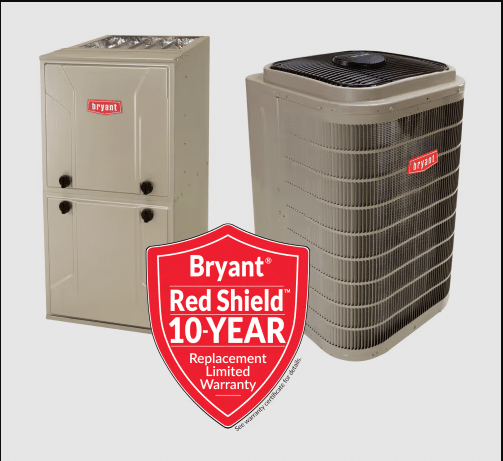Why Is My AC Not Blowing Cold Air?
Nothing can ruin a homeowner’s day more than a home AC unit that stops blowing cold air right in the middle of the summer. With sweltering temperatures, your home can quickly become uncomfortable and affect the overall air quality for your entire family. If your AC has stopped working properly and is no longer blowing cold air, here are some common problems and the causes behind them:
1. Clogged Air Filters
Before you call an AC repair specialist, be sure to check your air filter. A clogged filter that is full of debris is one of the most common reasons for a faulty AC, as it blocks cold air and prevents your home from cooling properly. You should be changing your air filter every month, so if you have skipped a couple of months, the filter could be the culprit.

2. Tripped Circuit Breaker
Fixing your air conditioner could be as simple as flipping a switch. Most central air conditioning systems operate on two circuit breakers – one for the inside and one for the outside. If the outside breaker is tripped, the unit will still appear to be working, but it won’t be producing any cold air. Resetting the breaker may be enough to restart the unit and make sure that both circuits are working properly.
3. Wrong Fan Setting
If you can feel that the air is coming out of the vents, but it isn’t actually cold, you need to go to your thermostat settings. The fan switch should be in the “auto” position. This tells the air conditioner to turn off once the home has reached the programmed temperature. When the condenser fan is “On,” it will continue to blow air without cooling it first.
4. Malfunctioning Fan Motor
A bad AC motor can prevent cool air from properly flowing throughout your home. If you notice weak airflow, warm air, rattling noises, or that the fan simply isn’t starting or stopping properly, it is time to have your fan motor replaced.
5. Clogged Condensate Drain Lines
The drain lines in your indoor AC unit work to remove condensation that often build up within your evaporator coil. Typically, the moisture drains out of your indoor unit into the floor drain or it may be pumped out of the home by a condensation pump. However, this line can become clogged and affect how well your unit operates. You may be able to unclog the line yourself by turning off the unit, locating the cleaning ports, assessing the clog, and using a cleaning solution of water, soap, and vinegar to remove the clog.
6. Inadequate AC System
Have you noticed that your AC unit is constantly running and increasing your utility bills, but your home never seems to actually feel cool? If so, you could have an undersized unit that simply isn’t powerful enough to service the amount of square footage you need it to. In this case, the only solution is to purchase a properly sized unit for better energy efficiency.
7. Faulty Compressor
The compressor in your condenser unit is possibly the most important part of your air conditioner, as it is responsible for pumping the refrigerant from the inside to the outside unit so that heat exchange can occur.
When it is not working properly, it affects the entire system. Some issues, like dirty air filters, are more straightforward to troubleshoot than others. However, when the air filter is cleaned, and it still isn’t working, the problem most likely lies elsewhere.
If you see signs of a leak on your outdoor unit, you should contact a professional. Even the smallest leak can cause the compressor to freeze up.
8. AC Unit is Leaking Refrigerant
Refrigerant is an essential component of every AC unit. If there is a leak in the refrigerant lines causing low refrigerant levels, your home won’t be cooling properly and you may find yourself constantly adjusting the temperature settings in order to feel comfortable. A refrigerant leak can also cause the AC’s coils to freeze and produce a hissing or gurgling sound as air seeps through the frozen evaporator coil or condenser coil. Because refrigerant is a dangerous chemical, you will want to call a professional if you suspect a leak.
9. Leaking Ductwork
As air gets cooled within your air conditioning system, it moves through an intricate network of insulated ducts. This ductwork comprises both return air ducts and a supply system that runs within walls, floors, and ceilings. When your air conditioning unit starts blowing out warm air, it might indicate a potential leak in your ducts. Duct leaks can arise due to subpar installation or damage to the ducts, and they can manifest anywhere within the duct network.
Leaky ducts can lead to your cooling system expelling warm indoor air, as the conditioned air escapes from the ducts before it reaches its intended destination. Such leaks can also permit warm air to infiltrate the AC unit, diminishing its efficiency and making it work harder to maintain indoor cooling.
10. AC Unit Has Experienced Normal Wear and Tear
Unfortunately, AC units don’t last forever. The average lifespan of a central HVAC system is 12 to 20 years. If your unit has been working to cool your home for more than two decades, it shouldn’t come as much of a surprise that it isn’t working like new. Normal wear and tear can cause the unit to operate less efficiently and signal that it may be time to install a new system.
The good news is that if your central AC is not blowing cold air, there is probably an easy fix. Restoring your unit and achieving a cooler and more comfortable indoor environment may be as easy as changing your air filter or resetting a circuit. Even more complex fixes that require professional assistance are usually relatively easy for someone with the right skills and experience. Once your problem has been diagnosed, it won’t take long to return your home to normal and enjoy a cool oasis away from the summer heat.
Schedule Your Air Conditioning Repair Today
If you suspect that you are experiencing any of the common AC problems above, please don’t hesitate to give our HVAC company a call to diagnose the problem.
We can have a professional HVAC technician at your home as quickly as possible to fix any issues with your AC not cooling properly.
To set up your air conditioning service repair today with Superior Service, call the HVAC professionals or fill out the online form below.
"*" indicates required fields





